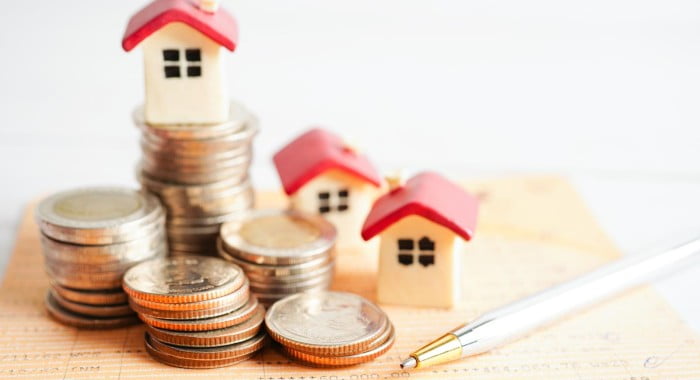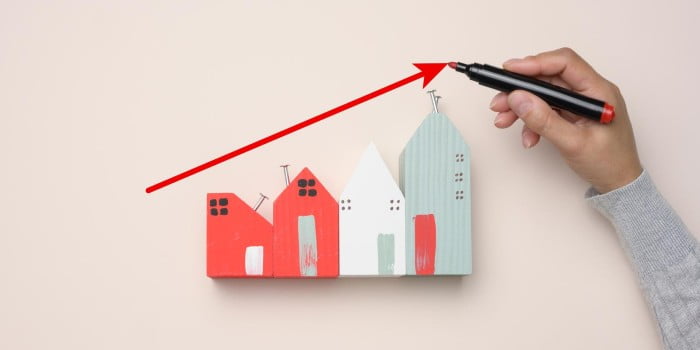5 December 2023 – 2023 has been a challenging year for the property market. But according to new figures, house prices have risen again in Novbmber. So is the housing market starting to recover?
During the summer, the housing market traditionally slows down. And this year was no exception. However, the summer was quieter and slower than usual, prompting many commentators to speculate that high borrowing costs and the ongoing cost-of-living-crisis had finally caught up with the market.
But as the summer turned into autumn, prices started to rise again slowly, which could be a sign that the housing market is starting to recover. So what is going on?
0.2% Price Rise In November
Nationwide‘s latest House Price Index revealed that house prices have risen for the third consecutive month. November saw an increase in asking price of a modest 0.2% compared to the previous month.
The average asking price in the UK is now £258,557, which is however, still 2% lower than at the same time last year, down from 3.3% in October.
So while it is likely that we will end up with a negative annual growth at the end of this year, the drop won’t be as much as many industry insiders have anticipated at the start of the year.
A price fall in double figures is now almost impossible. Nationwide has put this uplift down to increasing affordability. Since July mortgage rates have been falling steadily, with the average two-year fixed rate mortgage now at 5.52% and the five-year fixed rate is at 5.11%.
And there are fixed-rate deals available below 5% too. Inflation is now also below 5%, which will take off some pressure for many households.
Many insiders of the financial market anticipate that interest rates have now peaked and expect them to fall to 3.5% in the next few years. The Bank of England has kept the base rate steady at 5.25% for several months now.
But they have indicated that a cut in interest rates is not going to happen any time soon, with inflation still more than double the Bank’s target of 2%.
Nonetheless, lower mortgage rates have increased affordability, giving homebuyers more confidence in the market again.
Asking Prices And Market Expectations Mismatched

However, while prices have started to rise again, albeit slowly, buyer’s and seller’s price expectations seem to differ widely.
According to research by Propertmark, 90% of homes sold by their members in October sold for below the asking price. This is up from 76% in September.
This is a clear sign that buyers are more price conscious and are taking their time to decide. While supply is still a challenge, demand has decreased, giving buyers breathing space.
The high rate of sellers having to accept a lower price seems to indicate that market expectations and asking prices or valuations don’t match up. This will inevitably lead to properties selling slower.
Unless they are priced competitively. The market has shifted and decreased affordability is dictating what buyers can afford. And in general, this is less than a year ago.
So pricing a property correctly is even more important now, if it is to sell quickly.
Is Housing Market Recovering For Good?
With the housing market starting to recover, many homeowners and buyers will wonder what this means for house prices in the next year.
Even though inflation has fallen, and mortgage rates are also on a downward trend, affordability is still a struggle for many buyers. Interest rates are unlikely to fall any time soon, which means affordability won’t get better quickly.
As a result of this, Rightmove forecast that asking prices will fall by 1% in 2024.
We predict a modest average fall of 1% in new seller asking prices next year. This will be felt more keenly in some areas of Great Britain than others. The housing market is made up of thousands of local markets, each with their own unique dynamic of supply and demand. In areas with more discretionary sellers and fewer homes for sale, we may see new seller asking prices remain flat, or even very slightly increase compared to this year.
Tim Bannister, Head of Property Science at Rightmove
Our Opinion
The steady rise in house prices, albeit just marginally, in the last three months might come as a surprise to many would-be buyers. With affordability still a struggle, owning a home is a far off dream for many, especially single first-time buyers.
What should be taken into account is that these figures are in comparison to the previous months. On an annual basis, house prices are still falling, even if just by 2% in November.
So is the housing market starting to recover? Well, it depends on whether a slight increase in house prices can be seen as a sign of it. In our opinion, price increases alone don’t mean that much, especially if they are only marginal.
Houses take longer to sell now than they did this time last year. But more importantly, a huge number of properties sell below asking price or have their asking price reduced.
This shows that it will be difficult for the market to recover. What is needed is a price adjustment. The increase of over 20% in a matter of two years, during the pandemic, was just too much.
And if people can’t afford to buy, then monthly price increases won’t help the market to recover. A rebalancing is necessary, before the market can get back to strength.




